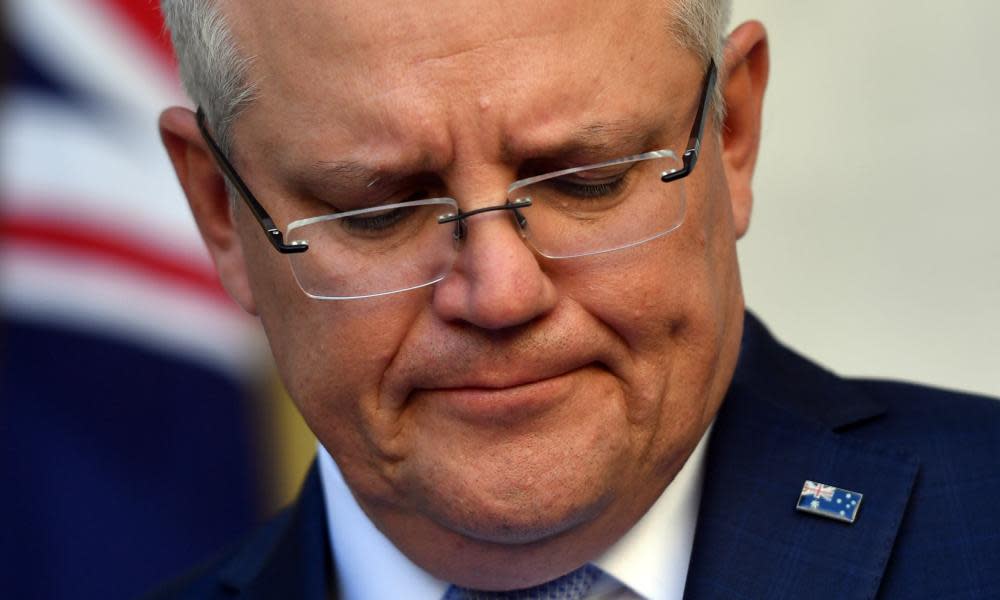The 'job snob' stereotype has been used for decades to denigrate the unemployed. Facts tell a different story

The heir to a multimillion-dollar pub empire, Craig Laundy, was dispatched against Australia’s unemployed on Tuesday.
The former Liberal MP was quoted by News Corp claiming that it wasn’t, you know, a global, invisible virus that’s killed half a million people keeping people out of work. It was the unwillingness of working people to “get off their backsides”.
“Mr Laundy said one mother had declined shifts because she wanted to spend time with her children,” News Corp said, which is outrageous; clearly a lethal pandemic is precisely the time for parents to abandon their children to the disruption and terror. Especially when their mental health is so precarious.
Related: We need to consign the term ‘dole’ and its nasty derivatives to pre-Covid history | Cassandra Goldie
But Laundy showed no sympathy for those affected by the historically unprecedented global mental health crisis the virus has provoked. One of Laundy’s hospitality workers overcame the entrenched Australian reticence to discuss mental illness, telling his boss psychological illness impacted his ability to work. Laundy reportedly dismissed it as a “piss-take”. In a national newspaper.
What would provoke such cruelty? Ideological loyalty and political desperation. On Monday, the Liberal prime minister began to soften his path for the dismantling of jobkeeper and jobseeker subsidies that have kept millions of Australians solvent as the virus infected the economy and jobs disappeared. Echoing the evergreen “job snob” stereotypes the political right have used for decades to denigrate the unemployed – a tactic that handily terrifies waged workers into accepting lower salaries than they deserve – Morrison claimed providing liveable incomes to the unemployed dangerously disincentivised these people to work. His evidence, he admitted, was only “anecdotal”.
Facts – conversely – tell a different story; specifically, that unemployment levels are only ever about the availability of jobs, which is why Switzerland, Norway, the Netherlands and Denmark maintain both generous dole provisions simultaneous to high employment.
Presently, in Australia, there are but a rare few jobs left to get. In June, the Australian Bureau of Statistics reported the pandemic’s grim impact; official stats compiled in May, showed a loss of 227,000 jobs in one month alone, 927,000 Australians unemployed and an unemployment rate of 7.1%.
Joblessness does not result from an outbreak of laziness. It’s not a mass lack of gumption
It’s their statistical sleight-of-hand to pretend a single hour of work in a fortnight is somehow enough to shuffle someone into the “employed” column, but coronavirus is causing even deft old players to drop their cards; the 3.3 million Australians receiving jobkeeper because their employers can’t afford to pay them aren’t considered “unemployed”. And if you’re among Australia’s army of casualised subcontractors, technically, you aren’t “looking for work” either; you’re hustling for clients. So what if there are none?
There are 645,000 Australians in an arts and entertainment industry heavily casualised like this, and it’s been shuttered for months; only 20,000 of its workers met the strict year-at-the-same-job criteria of jobkeeper. That’s more than half a million Australians whose status hasn’t necessarily been caught by the ABS, and it’s just one industry among many hard hit. Hospitality, transport, tourism, media, events, universities, personal services and wide swathes of retail are haemorrhaging. The lovely couple who run a homewares shop around the corner from us sent out a sad message the other day that their business is closing; there are no longer enough customers to cover the bills. Are all devastated small business owners “job snobs” now, too, Scott Morrison?
Unlike the prime minister, Australians grasp that reality trumps ideology. We know coronavirus is causing the shutdowns, the closed stadiums, grounded planes, cancelled weddings (mine), the stay-at-home orders, the business-as-anything-but-usual. Every new spike makes it clear; the choice coronavirus imposes on every human society is between safety or suffering. Joblessness does not result from an outbreak of laziness. It’s not a mass lack of gumption.
Australia has seen enough shut shops and Centrelink queues to disbelieve the old beat-ups. So why is the prime minister restarting them?
Related: ‘Deeply hurtful’ claims of Australian jobseekers turning down work are based on scant evidence
Neoliberals like his government are wedded to the economics of total market liberty, not responsible government enterprise. The need for economic stimulus screams for the government to lead direct job creation to stimulate consumer spending, but having bought themselves time with the jobkeeper provision to think through how to do it, the Liberals instead defaulted to ideological preferences. They are adamantly not intervening to save 5,000 jobs at Virgin Australia or 6,000 at Qantas. They have abandoned workers in remaining government enterprises and will not be saving 2,000 jobs at Australia Post, 50 at the CSIRO, 30 at the National Gallery or a boggling 30,000 jobs at Australia’s public universities. When questioned about job cuts announced at the ABC, Morrison actually smiled. The latest spending announcements from Morrison’s government are but theatricalised reminders about investments committed to long ago; like Malcolm Turnbull’s 2016 “Snowy 2.0” scheme, and defence spending that was itself reaffirmed last year. They will not come with an injection of extra jobs. There is no coordinated strategy.
Economists are calling the impact of coronavirus a “Depression-level crisis”; it is stunning to consider the Liberal government refusing to remember the lessons of the Depression. Pandemic or not, sacked workers cannot furnish markets with spending, and neither can the workers without jobs to go back to when jobseeker payments are halved and jobkeeper taken away – scheduled for September. They won’t be spending big in the Laundy family’s 30 pubs.
They’ll be fighting to keep their families together – nursing a bitter awareness of just who abandoned them, and for how little.
• Van Badham is a Guardian Australia columnist

 Yahoo News
Yahoo News 
